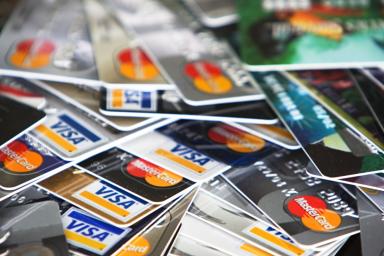Sole trader bank accounts
Setting up as a sole trader is the quickest and easiest way to start a new business.
You simply register as a self-employed sole trader with HM Revenue & Customs (HMRC) and start your business.
Being a sole trader does, however, means taking on some financial responsibilities and before deciding to set up as a sole trader, you should take independent specialist advice to determine if this is the best option for you.
From filing your income and tax with HMRC to dealing with invoices, keeping tabs on your business finances is a priority – making picking from the range of sole trader bank accounts a priority.
As a sole trader, you can use your personal bank account for your business finances but taking this approach can make life harder in the long run.
Using dedicated sole trader bank accounts let you stay on top of cash flow and makes filing annual returns easier.
The bank account you use depends on the structure of your business.
Limited companies and Limited Liability Partnerships are legally required to use a dedicated business account for all transactions, such as expenses and income.
This is because a limited company is a legal entity, separate to the business owner or director.
As the limited company owns any money it generates, finances must be kept separate from personal accounts.
There are specific legal ways to move money from a business account to personal income, such as paying a salary via PAYE or paying a dividend on profits after corporation tax.
It’s a different story for sole traders.
Can a sole trader use a personal bank account?
As a sole trader, you’re not legally required to have a business bank account.
You can use your personal bank account for all business transactions.
This is because as a sole trader, your personal and business income is treated as one and the same by HMRC for tax purposes
However, many sole traders and small businesses that are not incorporated find it easier to track their business finances by opening dedicated sole trader bank accounts.
What is a sole trader?
Before investigating sole trader bank accounts, check that your business is classified as a sole trader.
If you’re self-employed and run your own business but have not incorporated a limited company then you’re likely classified as a sole trader.
Three-quarters of British businesses are sole traders (.pdf, 400kb - opens in new window), and while many are single-person businesses, sole traders can also hire staff.
You’ll need to notify HMRC that you’re self-employed and file an annual self-assessment.
As a sole trader, you get to keep all the profits your business makes after tax, but you are also personally liable for any losses and debts your business incurs.
What are sole trader bank accounts?
Sole trader bank accounts are simply business accounts.
Most high-street banks – as well as specialist business banks – offer them and they work in a similar way to a personal current account.
Most offer banking facilities including a business cheque book, a debit and credit card, online and telephone banking, as well as overdraft facilities.
There are some differences between sole trader bank accounts and personal bank accounts.
Business bank accounts generally pay far lower interest rates than personal bank accounts, and fees can be significantly higher.
Not only will you have to pay a monthly account fee – though many banks waver this fee for fixed periods for new customers – but transactions such as paying in cash over the counter or cashing cheques can sometimes incur additional fees.
There are fewer perks with sole trader bank accounts compared to personal bank accounts, such as cashback offers or vouchers.
However, many will offer perks such as free business advice, access to a business bank manager and discounts on business services and products such as online accounts software.
Why use sole trader bank accounts?
Despite monthly fees and transaction costs, there are some clear benefits to opening a separate business bank account.
You might have to open a business account – Depending on the scale and scope of your business, many high-street banks won’t let you use your existing personal bank account for business banking.
Check the terms and conditions if using your personal bank account for business, as banks can insist you stop and even close your account if you continue.
Banks will look for high levels of transactions and lots of over-the-counter cash and cheque deposits as signs you’re using a personal account for business.
Clarity for filing annual returns with HMRC
As a sole trader, business and personal income is treated as one for tax purposes.
However, you can offset allowable expenses such as equipment, travel and salaries against income.
With everything in your personal bank account, you’ll need to carefully look through every transaction to identify those related to your business.
With a business bank account, it’s easier to see all your business income and expenses in one place, making filling in your tax return easier.
Keeping an eye on cashflow
Separate sole trader bank accounts make it easier to see the cashflow of your business.
You can see how much cash the business has, when you’ve been paid or have paid suppliers.
If your business finances are mixed up with your personal ones, it can be difficult to see if your business is about to run into cashflow problems.
Your business is growing
Business might be booming, and you’re finding yourself making lots of deposits or paying in cash regularly.
Additional costs, such as PAYE staff costs and payments such as National Insurance Contributions and tax to HMRC, could be a sign that you’d be better off looking for the best bank account for a sole trader.
You’re considering setting up as a limited company
By law, limited companies must operate a business account.
It’s also a requirement if you want a business loan, and some merchant payment services require a business account to pay money into.
It looks professional
If you deal with other businesses, then a business bank account will appear more professional.
It’s far better to request invoice payments to be made to ‘Your Sole Trader Business’ rather than your personal bank account.
This is especially true if you’re registered for VAT.
What to look for when choosing sole trader bank accounts
It can be tempting to sign up to the first business bank that offers enticing initial deals and discounts.
Most banks look to win new business by offering 12-18 months of free banking, which can be handy when you’re starting up and money is tight.
However, it’s best to look past the offers and choose the best value account.
The key is to weigh up transaction costs and other business benefits.
Business bank account costs
Business accounts can incur significant banking costs, especially when any free banking period expires.
Business accounts charge different fees for paying in cheques, depositing cash and using an overdraft facility.
Many banks offer accounts that are more suited to certain transactions, such as paying in cash.
Do the research and pick the account that has the lowest fees for the transactions you’re likely use the most.
Business account reviews
Search online for business reviews of bank accounts.
Some banks seem notoriously slow at processing applications or aren’t renowned for excellent customer service.
Banking features and perks
Think about what your business needs from a bank account.
Evaluate transactions limits and access to overdraft facilities if you need to go overdrawn.
Other considerations include its ability to link to business accounting software to reconcile your accounts or offering an app for banking on-the-go.
Accessibility
If you plan on using a lot of counter services, such as depositing cash, then it makes sense to choose a bank that is located close to your business with easy access such as parking.
Larger branches tend to have a dedicated business bank manager, so check how easy it is to meet with the business bank manager.
If you’re setting up a new business, access to online tools and advice can be invaluable, so check what’s on offer.
In all cases, you need to treat sole trader bank accounts differently to personal banking.
Treat banks as you would any supplier and let them know you’re evaluating several different banks.
You’re looking for a bank that wants your business and is prepared to offer you a competitive deal.
Take a financially savvy approach, weighing costs and features to ensure you get the banking service you need as a sole trader.
Most high street banks offer business accounts, and some offer free online banking for start-ups for 12 months or more.
Want to learn how to manage your start-up’s finances? Check out our free online courses in partnership with the Open University on being an entrepreneur.
Our free Learn with Start Up Loans courses include:
- Introduction to bookkeeping and accounting
- Companies and financial accounting
- Financial methods in environmental decisions
Plus free courses on finance and accounting, project management, and leadership.
Disclaimer: The Start -Up Loans Company makes reasonable efforts to keep the content of this article up to date, but we do not guarantee or warrant (implied or otherwise) that it is current, accurate or complete. This article is intended for general information purposes only and does not constitute advice of any kind, including legal, financial, tax or other professional advice. You should always seek professional or specialist advice or support before doing anything on the basis of the content of this article.
The Start-Up Loans Company is not liable for any loss or damage (foreseeable or not) that may come from relying on this article, whether as a result of our negligence, breach of contract or otherwise. “Loss” includes (but is not limited to) any direct, indirect or consequential loss, loss of income, revenue, benefits, profits, opportunity, anticipated savings, or data. We do not exclude liability for any liability which cannot be excluded or limited under English law. Reference to any person, organisation, business, or event does not constitute an endorsement or recommendation from The Start-Up Loans Company, its parent company British Business Bank plc, or the UK Government.
Your previously read articles
Apply for a Start Up Loan
We've helped over 100,000 businesses get off the ground with a Start Up Loan. Can we help make your business dream a reality?
Find out more for a start up loan
Essential guide to starting a business
Our Essential Guide to Starting a Business is your roadmap to turn your business idea into a reality.
Across 12 chapters, you'll discover a wealth of information designed to empower and equip you with the knowledge needed to successfully launch and manage your new venture.
Sign up for our newsletter
Just add your details to receive updates and news from Start Up Loans
Sign up to our newsletter


